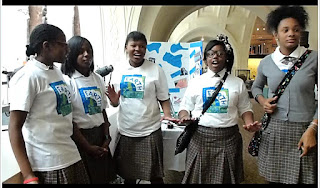Posted June 15th, 2012 in
Education,
Great Lakes Cleanup
IISG education team members Robin Goettel and Terri Hallesy partnered with Angie Viands of the Field Museum’s Earth Force Program, along with students and teachers within the Calumet community to raise awareness about properly disposing of pharmaceuticals and personal care products (PPCPs).
Windy City Earth Force is part of the museum’s Calumet Environmental Education Program (CEEP). Earth Force is a program that engages 7th and 8th grade students in action projects to address environmental issues in their community.
Students from four schools developed community-based information projects that were showcased at the Earth Force youth summit at Chicago’s Field Museum on May 8, 2012.
Below is a rundown of the final projects that were part of the event:
Thomas Hoyne Elementary
Ms. Pettis’ 7th grade students’ goal was to find out about potential health concerns for humans and animals caused by PPCPs and to find out what health concerns may lurk within our water supply.

They produced several informational items to help raise awareness about how people contribute to pollution. Those items included:
– Letters to stakeholders, including businesses, legislators, and environmental organizations (including National Resources Defense Council and Illinois Department of Agriculture) about contaminates in the waterways and the importance of water quality standard improvements.
– Fliers to distribute to the public, as well as family and friends about the issue of contaminants and how they can make a difference in their community.

– Posters in local businesses and churches with the message “Stop Pollution in our Water: be green, stop pollution, and save our Earth.”
– School-wide surveys to determine the pollution tolerance index rating for various aquatic species.
– E-mail messages to editors at Southtown Star newspaper and Treehugger.com requesting them to publish their classroom project.
The final display at the summit included information about how personal care products (PCPs) can be harmful in waterways, as well as additional steps that people can take to help solve this problem. Students displayed sample PCPs that are often found in aquatic ecosystems in the hopes of raising awareness about contaminants in water.
Bennett Elementary

Ms. Millner’s students created a poster display, “Don’t Trash it! Bag It!” They had researched disposal methods for medications, hair care products, and cellphones.
The students educated their fellow classmates about proper disposal methods and passed out literature to hundreds of students to take home to their families. The handouts included information about using either coffee grounds or kitty litter to dispose of the unwanted medicine in the trash, or bringing these pharmaceuticals to a medicine collection site or a community collection event. They also conveyed the message that it’s better to use up hair care products instead of throwing them away. The students cited earth911.com as a useful website for information about how to properly dispose of personal care products.
Students commented that “this project helped their community because people really need to know how hair care products get into our waterways and can endanger aquatic species,” and “I’m doing a big part in the community. People should wake up to it so that our environment can be more pure.”
Robert A. Black Magnet School
Ms. McNeal’s after-school Science Club students got the word out about proper disposal of PPCPs by writing and performing a rap song that they shared with their community.

In addition, they developed a flier about how to help dispose of medications including the location of the nearest police station collection box.
All of the students did a terrific job of finding out about these issues and coming up with ways to share that information with their community. Congratulations to the students, teachers, and the Earth Force program on making the event such a success.
This “Undo the Chemical Brew” education project is funded through the Great Lakes Restoration Initiative. Check out the latest information by visiting www.unwantedmeds.org.



